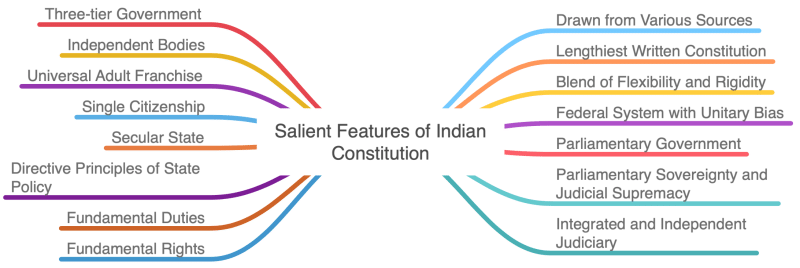Chapter - 3: Mindmap | Additional Study Material for UPSC PDF Download

Salient Features of Indian Constitution
1. Lengthiest Written Constitution
(a) Originally had Preamble, 395 Articles, 8 Schedules and 22 Parts
(b) Presently contains Preamble, 448 Articles, 12 Schedules and 25 Parts
(c) Factors
- Geographical Vastness
- Broad Historical Background
- Single Constitution for both Center and State
- Dominance of legal luminaries
2. Drawn from Various Sources
(a) Structural Part
- Government of India Act, 1935
(b) Phillosophical Part
- American Constitution
- Irish Constitution
(c) Political Part
- British Constitution
(d) Other Provisions
- Canadian Constitution
- Soviet Constitution
- German Constitution
- Franch Constitution
- South African Constitution
- Japanese Constitution
3. Blend of Flexibility and Rigidity
(a) Amendment through Simple Majority
(b) Amendment under Article 368
- By Special Majority
- By Special Majority with ractification by half of the states
4. Federal System with Unitary Bias
(a) Federal Features
- Two Government
- Division of Powers
- Written Constitution
- Supremacy of Constitution
- Rigidity of Constitution
- Independent Judiciary
- Bicameralism
(b) Unitary Features
- Strong Center
- Single Constitution
- Single Citizenship
- Flexibility of Constitution
- Integrated Judiciary
- Appointment of state governors by the Center
- All-India Services
- Emergency Provisions
5. Parliamentary Government
(a) Features
- Presence of nominal and real executives
- Majority party rule
- Executive is responsible to the legislature
- Membership of the ministers in the legislature
- Leadership of the Prime Minister or the Chief Minister
- Dissolution of the lower house
6. Parliamentary Sovereignty and Judicial Supremacy
(a) Check on Parliamentary powers through Judicial Review
(b) Check on Judiciary through power of Parliament of Constitutional amendment
7. Integrated and Independent Judiciary
8. Three-tier Government
(a) Union Government
(b) State Government
(c) Third-tier Government
- Urban Local Bodies
- Panchayats/Rural Local Bodies
9. Independent Bodies
10. Universal Adult Franchise
(a) Right to vote to every citizen of India with a minimum age of 18 years
11. Co-operative Societies
12. Emergency Provisions
(a) National emergency on the ground of war or external aggression or armed rebellion under article 352
(b) State emergency (President’s rule) on the ground of failure of Constitutional machinery in the states under article 365
(c) Financial emergency on the ground of threat to financial stability or credit of India under article 360
13. Single Citizenship
14. Secular State
(a) No official Religion of Indian State
15. Directive Principles of State Policy
(a) Part IV of the Constitution
(b) Classified into
- Gandhian Principles
- Liberal-Intellectual Principles
- Socialistic Principles
16. Fundamental Duties
(a) Part IV-A of the Constitution under Article 51-A
(b) 11 Fundamental Duties
17. Fundamental Rights
(a) Right to Equality (Article 14-18)
(b) Right to Freedom (Article 19-22)
(c) Right against Exploitation (Article 23-24)
(d) Right to Freedom of Religion (Article 25-28)
(e) Cultural and Educational Rights (Article 29-30)
(f) Right to Constitutional Remedies (Article 32)
|
20 videos|561 docs|160 tests
|
FAQs on Chapter - 3: Mindmap - Additional Study Material for UPSC
| 1. What is the eligibility criteria for the UPSC exam? |  |
| 2. How many attempts are allowed for the UPSC exam? |  |
| 3. What is the syllabus for the UPSC exam? |  |
| 4. How can I prepare for the UPSC exam effectively? |  |
| 5. What is the selection process for the UPSC exam? |  |
|
20 videos|561 docs|160 tests
|

|
Explore Courses for UPSC exam
|

|

















